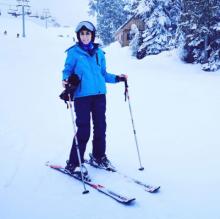Hadis Mozaffari
Why did you decide to pursue a graduate degree?
I have continued graduate studies both for professional and personal reasons. Nutrition is a field with a lot of unanswered questions which essentially is not due to lack of research but rather due to lack of high-quality evidence. So, as discovery is thrilling for me, I have pursued graduate study to acquire new skills and gain a more in-depth understanding of my field to address some of these knowledge gaps, particularly for diabetes prevention. For me, the thought that my novel solutions can contribute to improving people's quality of life and health is very enjoyable. Moreover, I have opted for graduate study to gain more recognition and credibility, which are two important factors to set me apart from other job candidates in today's highly competitive marketplace. Apart from these and as I have expected, the graduate study has also given me a distinct opportunity to actively work and communicate with inspirational individuals who have had a profound impact on shaping my life and personality. Being in graduate school has been a chance for me to discover a lot about myself.
Why did you decide to study at UBC?
I made UBC my first choice because of its strong academic community, resources for professional development, and opportunities for international collaboration and mentorship. The Human Nutrition program in UBC’S Faculty of Land and Food Systems is home to leading researchers, including my PhD supervisor Dr. Annalijn Conklin, whose research interests greatly align with mine and I was excited to work with, and learn from, her. I knew, thanks to my supervisor, I would have the privilege of working with one of the world's largest longitudinal studies on diabetes which is administered by the International Agency for Research on Cancer – World Health Organization (IARC-WHO) in Europe and definitely I did not want to miss this chance. I have also found a lot of free workshops and webinars on state-of-the-art analytic methods on the UBC website, which are usually offered by the library for helping students with their research. Finally, I believe mentorship opportunities in UBC’S REX program provide students with unique skills and experiences that surpass traditional graduate education for mobilizing knowledge within academia.
What is it specifically, that your program offers, that attracted you?
I believe one of the best things about my program is world-renowned faculty members with highly reputable training, extensive experience, and cutting-edge research in the field of nutrition. This indeed is an excellent opportunity for collaboration, learning, broadening one's horizons and these relationships will be valuable for years to come.
What was the best surprise about UBC or life in Vancouver?
I was surprised by the picturesque location of the campus! UBC is surrounded by very beautiful mountains and is close to the ocean.
What do you see as your biggest challenge(s) in your future career?
I have found it difficult to communicate my research and technical information with researchers outside of my discipline.
How do you feel your program is preparing you for those challenges?
In UBC and specifically in our program there are a lot of opportunities for trainees to present their work and practice confidence for public speaking such as graduate seminars and conferences, research days, and lab meetings.
What aspects of your life or career before now have best prepared you for your UBC graduate program?
My past education, research, leadership roles, and communications have equipped me with a competency that is necessary for success in graduate study at UBC. I passed the foundational courses across a variety of subjects and graduated as the second top student in my bachelor's degree program. This led me to rank first for graduate studies at the best university in Iran in the field of nutrition: Tehran University Medical Sciences (TUMS). Since beginning my master’s at TUMS, I assumed a lead role in numerous research projects which were the first of their kind in the Middle Eastern context and funded by the very renowned research institutes. Beyond my research activities, I also volunteered to be the Director of the Students’ Scientific Research Center (SSRC) of the nutrition department at TUMS and in that capacity, I gained a lot of leadership experiences that I always cherish. I also consider myself lucky for educating in the stimulating environment of TUMS, having great fellows, and being mentored by outstanding supervisors who have been great role models for me including Dr. Leila Azadbakht and Dr. Maryam Mahmoudi. Finally, I have to acknowledge my family, friends, and loved ones whose continuous support motivated me for this academic journey so far away from home.
What do you like to do for fun or relaxation?
I spend my free time doing yoga, meditation, reading psychology books and listening to motivational speakers. I also enjoy nature and lifestyle photography and recently have a newfound interest in ski and ice skating.
What advice do you have for new graduate students?
I suggest trying to take every chance you have to expand your networking circle because the connections you establish help you to realize what drives, inspires and fulfills you in academic and even in personal life. Try to find a balance between research and life. And lastly, do not rush your degree trajectory by constantly thinking forward about the next step, but instead, be mindful of this journey and celebrate even small achievements.

